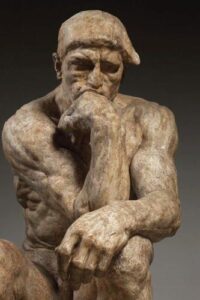Things I’ve Been Thinking About Lately

White Privilege, Intersectionality, Critical Race Theory, Identity Politics… How Academia’s Dumbest Ideas Became So Popular
I had just finished a chapter of a book I’m writing in which, among other things, I consider why so many of the most popular ideas and ideologies being propounded in colleges and universities today are not just wrong, but downright stupid.
White Privilege, intersectionality, Critical Race Theory, identity politics, etc. – I’ve written about all of them here before, wondering how they could be so obviously nonsensical and yet so strongly promoted and consumed.
I was thinking about it again last week after watching the clown show that took place during the Congressional hearings on the pro-Palestinian protests at many of our most prestigious universities. I was trying to understand how the presumably intelligent presidents of Harvard, MIT, and U Penn – people who were all about student behavior codes that banned such “microaggressions” as using misgendered pronouns – could publicly defend student protesters that repeatedly called for the extinction of the Jewish state?
How could they be so dumb on both issues at the same time?
Moreover, how could all those pro-Palestinian student protesters believe their cause was right? That the largest genocide of Jews since the Holocaust was a legitimate “act of resistance” against an oppressive, colonialist, racist, and apartheid state of White supremacy?
Even more disturbingly, why did the media portray them in a positive light?
I have not yet developed a theory that feels complete, much less defensible. But here is what I’m thinking.
A college professor can have a splendid career at an “ordinary” college by being an excellent teacher as well as an actual expert in the subject he or she teaches.
My father, who was an exceptionally learned man, is an example. His dream was to be a playwright. But after writing several plays that were not commercially successful, he accepted the fact that, to support a family (that would soon include eight children), he had to get a “real” job. So, he became a professor of English, Greek, and Latin Literature at a local college on Long Island. He earned his living that way, supplemented by side gigs teaching mathematics and “speed” reading, for his entire career. He knew his Shakespeare and Homer and Joyce. He was also a very good teacher – so good that his classes were always maxed out early in the registration process.
His considerable skills would have been insufficient to get him tenure had he been teaching at Harvard, Yale, or Princeton. At those lofty institutions, success requires not just expertise, but the continuous production of scholarly papers and books that would demonstrate his bona fides.
In other words, he would have had to play the “publish or perish” game.
And here’s where we get into the question of how highly educated people can end up embracing stupid ideas.
Professors at prestige universities must write books and essays that are published by academic publishers. But academic publishers – and this is true to some extent of all nonfiction publishers – are reluctant to spend money on books that, however solid they may be in terms of research, are unlikely to get attention. Books that get attention draw attention to the publishers themselves. And that means growth, prestige, and profits.
So, if the goal of the professor/writer is limited to merely being edifying, there is no natural incentive to propose theses that are unable to get lots of attention.
In theory, academic publishers should be satisfied with books that correct some minor technical flaws in the accepted scholarly literature, the idea being that scholarship is advanced by strengthening and extending widely respected theories. (Scholarly research and writing was always thought to be a scrupulous and humble pastime.)
But however successful books like that may be at inching forward towards a deeper understanding of some esoteric subject, they will receive, at best, approval and praise from other scholars that are unknown to the larger world.
If modern scholars want to make a “splash” – if they want to propel their careers forward – they have to write something that, in some way, is bold and ambitious. Put differently, they must challenge or refute, in whole or in part, the accepted wisdom of the day.
It’s not easy to overturn or reinvent or even reshape ideas that have dominated a field of study. Standard academic ideas are standard for a good reason: They have resisted critical challenges time and time again, sometimes for centuries.
Faced with the task of coming up with an idea that is different, it’s nearly impossible for a modern scholar to resist the temptation to compose, instead, one that is simply new. An idea that is, however flawed, nonetheless exciting, superficially cogent, and, most importantly, appealing in some way to the current gestalt of the larger academic community.
Such ideas are not only attractive to academic publishers, they are attractive to the scholars that critique them in academic journals because they, too, are under pressure to have something new to write about.
They are all looking for ideas that are fresh but not flat-out nonsensical, newish and clever, but also supportive of the academic vibe of the time. These are the ideas that are endorsed and embraced.
So what academia gets, with every new generation of scholars and critics, is a set of “new” ideas that may be flawed, but at least have the benefit of seeming to be reasonable given the cultural prejudices of the day. And though they may have lost any relationship to logic, fact, or common sense, they are eventually accepted as “true.”
Fifty years ago, any academic that wrote a book promoting any of the crazy ideas out there today would have never seen that book in print.
The idea of White Privilege, for example, could not have become accepted were it not for Karl Marx’s idea, 100 years ago, that Capitalism and class conflict were the fundamental reasons for the unequal distribution of wealth. And the current ideas of intersectionality, Critical Race Theory, and identity politics could never have been taken seriously were it not for Marx’s illogical and false theories that power and class conflict were the root causes of inequality.
That is the situation we have today. The dominant social, political, and economic ideas embraced by elitist educational institutions are obviously and evidently ridiculous. But for those enclosed in academic echo chambers and social media algorithms, they seem not just perfectly reasonable, but virtuous and good.





